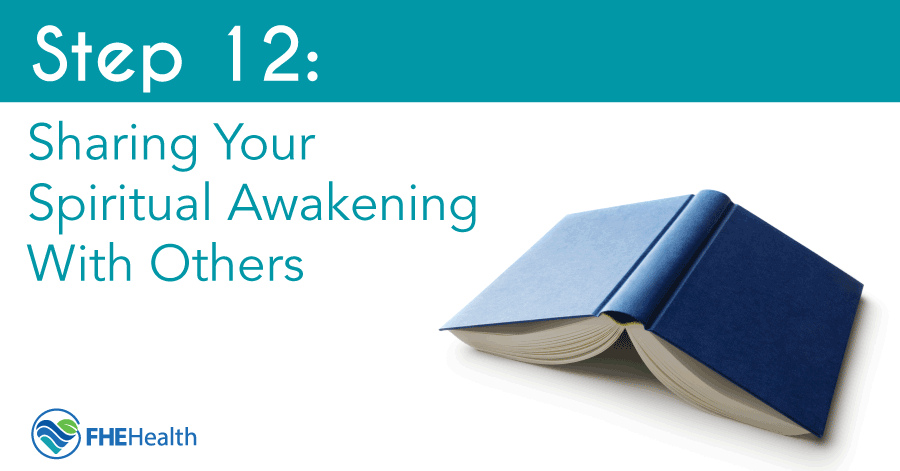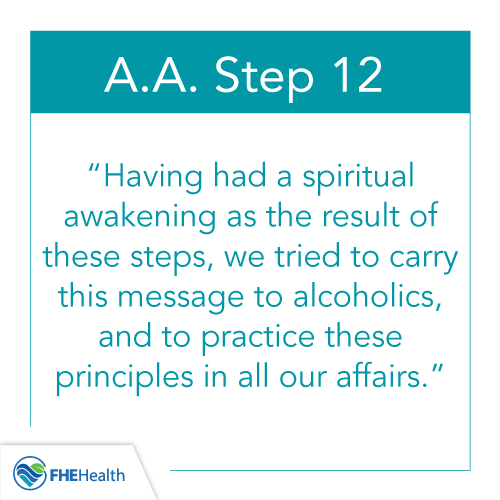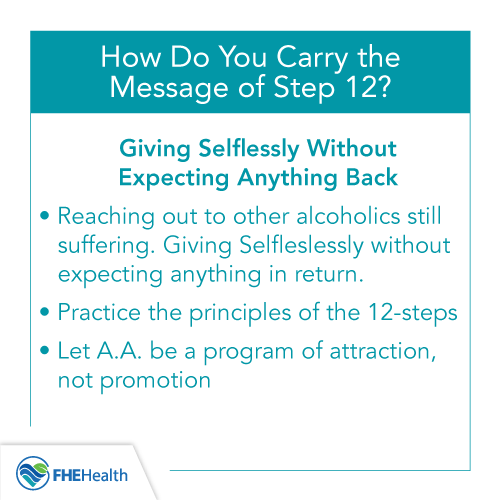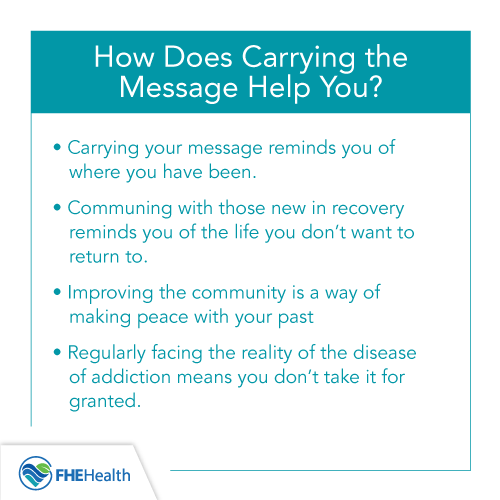
What Is the 12-Step Program?
 Originally described in a book called Alcoholics Anonymous: The Story of How More than One Hundred Men Have Recovered from Alcoholism (1939), the 12-step program consists of a set of precepts guiding substance abusers towards achieving a sober life. Some of these precepts include admitting you have an addiction, counseling others who suffer from addictions, and believing a higher power can help you defeat your addiction.
Originally described in a book called Alcoholics Anonymous: The Story of How More than One Hundred Men Have Recovered from Alcoholism (1939), the 12-step program consists of a set of precepts guiding substance abusers towards achieving a sober life. Some of these precepts include admitting you have an addiction, counseling others who suffer from addictions, and believing a higher power can help you defeat your addiction.
Step 12 of this program focuses on experiencing a spiritual awakening as the result of centering your life around the other 11 steps. This spiritual awakening is not a sudden, dramatic change but something that happens slowly as you progress through the various stages of recovery. Those who practice the 12 steps of AA often recall that they one day realized it had been days or even weeks since they last wanted a drink or drug. That’s part of the miracle of the 12 steps. On the way to this happening, learning about yourself, accepting and taking steps to resolve past errors, and making amends to those hurt by your addiction can help lead you to gratitude, humbleness, and a sense of meaning and hope essential to experiencing a spiritual awakening.
How Do You Recognize a Spiritual Awakening?
Your spiritual awakening during recovery begins when you find yourself actively thinking about things beyond your drug of choice. You begin to appreciate the purpose and meaning of life. Why am I here? What does it mean to exist? What is my destiny? These are all things you could not dwell on while controlled by a substance.
Most people spend months soul-searching before they realize they are in the midst of a spiritual awakening. Feeling a sense of openness, expansion and acceptance as old habits and thought patterns dissolve and a new self emerges is commonly reported by people adhering to the 12-step program. A craving for objective authenticity transforms your life as you edge closer to achieving the kind of peaceful mindfulness you never experienced as a drug addict or alcoholic.
Inner Peace
 What is inner peace, and how do you know you have finally attained it? Spiritualists say that inner peace is a state of physical and mental well-being emerging from a deep understanding of the importance of a bigger picture. In other words: Don’t sweat the small stuff. Don’t live in the past. Don’t dwell on “should have, could have” scenarios that cannot be changed and are meaningless.
What is inner peace, and how do you know you have finally attained it? Spiritualists say that inner peace is a state of physical and mental well-being emerging from a deep understanding of the importance of a bigger picture. In other words: Don’t sweat the small stuff. Don’t live in the past. Don’t dwell on “should have, could have” scenarios that cannot be changed and are meaningless.
By attaining a more profound understanding of how unproductive, harmful assumptions toward life shape how we cope with stress and trauma, we naturally achieve the inner peace we need to embrace a life-changing spiritual awakening.
Enlightenment
Enlightenment is a Buddhist concept explaining a profound understanding or new insight into problems you have been struggling to find meaningful answers to. Happening randomly and unexpectedly as you listen to others in group therapy, during meditation, or even when you’re just relaxing in a hot bath, enlightenment has been described as a bright, warm light amplifying in your mind accompanied by an exhilarating sensation of being aware that life has meaning and is the most valuable thing you possess.
Benefits of Meditating to Achieve a Spiritual Awakening
To meditate simply means to sit quietly, breathe deeply and slowly, and focus on an image that relaxes and unifies your inner self. Many Eastern religions incorporate meditation practices to facilitate emptying the mind of disorder and clutter. A mind free of worries and distractions can help you achieve your unique spiritual awakening by allowing you to concentrate on the here and now instead of a past you cannot change.
Metaphysical Spiritual Awakenings
Metaphysical spirituality encompasses the teachings of the spiritual masters — Buddha, Gandhi, Confucius, Mohammad, Jesus, and the founder of Taoism, Lao Tzŭ — and is a popular choice among recovering substance abusers interested in attaining a clearer, more personal sense of meaning and stability in their world.
Metaphysics is actually a branch of philosophy and science that studies the origins and purpose of the universe. It attempts to provide plausible answers that science has yet to discover using only empirical evidence. Because metaphysical spirituality does not adhere to a specific set of beliefs and is open to interpretation, patients in recovery may meditate about the various questions posed by metaphysics to further examine their inner self and discover a sense of meaning and peace previously missing from their lives.
Taoism and Spiritual Awakening
Taoist themes concern simplicity, naturalness, detachment from longing or desire, and the practice of nonaction. Taoism teaches that to live in peace and harmony with the self and the world, you must endeavor to abstain from struggling against the natural order of reality. Patients in recovery who want to eliminate stress and instability in their lives are often attracted to the purity of Taoist beliefs and behaviors. This more secular type of spirituality also emphasizes mindfulness, moderation in diet, exercise, deep breathing exercises, and communing with nature as a way to find harmony and strength within the self.
Step 12 and the Power of Prayer
 Praying is closely associated with the three major religions — Judaism, Christianity, and Islam — and involves asking for guidance or help from that religion’s specific God. For many recovering addicts, praying gives them peace of mind and a feeling of closeness with their God, whom they believe is watching over them and helping them maintain their sobriety. Twelve-step programs urge members to rely on prayer as a way of establishing a personal relationship with their religion’s primary deity and believe it is an invaluable tool that also strengthens and solidifies a person’s belief in something more than their life on Earth.
Praying is closely associated with the three major religions — Judaism, Christianity, and Islam — and involves asking for guidance or help from that religion’s specific God. For many recovering addicts, praying gives them peace of mind and a feeling of closeness with their God, whom they believe is watching over them and helping them maintain their sobriety. Twelve-step programs urge members to rely on prayer as a way of establishing a personal relationship with their religion’s primary deity and believe it is an invaluable tool that also strengthens and solidifies a person’s belief in something more than their life on Earth.
What Is the Value in Carrying the Message of Your Spiritual Awakening?
The easiest way to begin talking about your spiritual awakening to others is to use real-life examples describing moments and actions that filled you with feelings of enlightenment and peace. Remember, spirituality isn’t just about praying or meditating but about how you live your life. When your true spiritual self radiates throughout your daily life, others will naturally want to know more about your journey and how you were once so similar to them, but now lead a different life.
Sharing your spiritual awakening with others as a recovering addict is also a way to help make peace with your past by making amends with those you once neglected or hurt. One of the consequences of being a long-time addict in recovery is convincing others of your sincerity. Unfortunately, this may take more time than you thought. Telling others about your spirituality can help sustain your mental health during your recovery while also leading you to discover answers to questions you once thought unanswerable.
- Why the 12-step Program Still Works
- Step 1: Why the 12-step Journey Begins with Powerlessness
- Step 2: What is a Higher Power?
- Step 3: God as you Understand Him
- Step 4: Your Moral Inventory
- Step 5: Admitting Your Wrongs
- Step 6: Addressing Character Defects
- Step 7: Removing our Defects
- Step 8: Making a List for Amends Worksheet
- Step 9: Making Amends, How to Approach Step 9
- Step 10: Ongoing Inventory
- Step 11: Deepening Your Connection With God
- Step 12: Sharing Your Spiritual Awakening With Others
- Understanding AA Lingo






